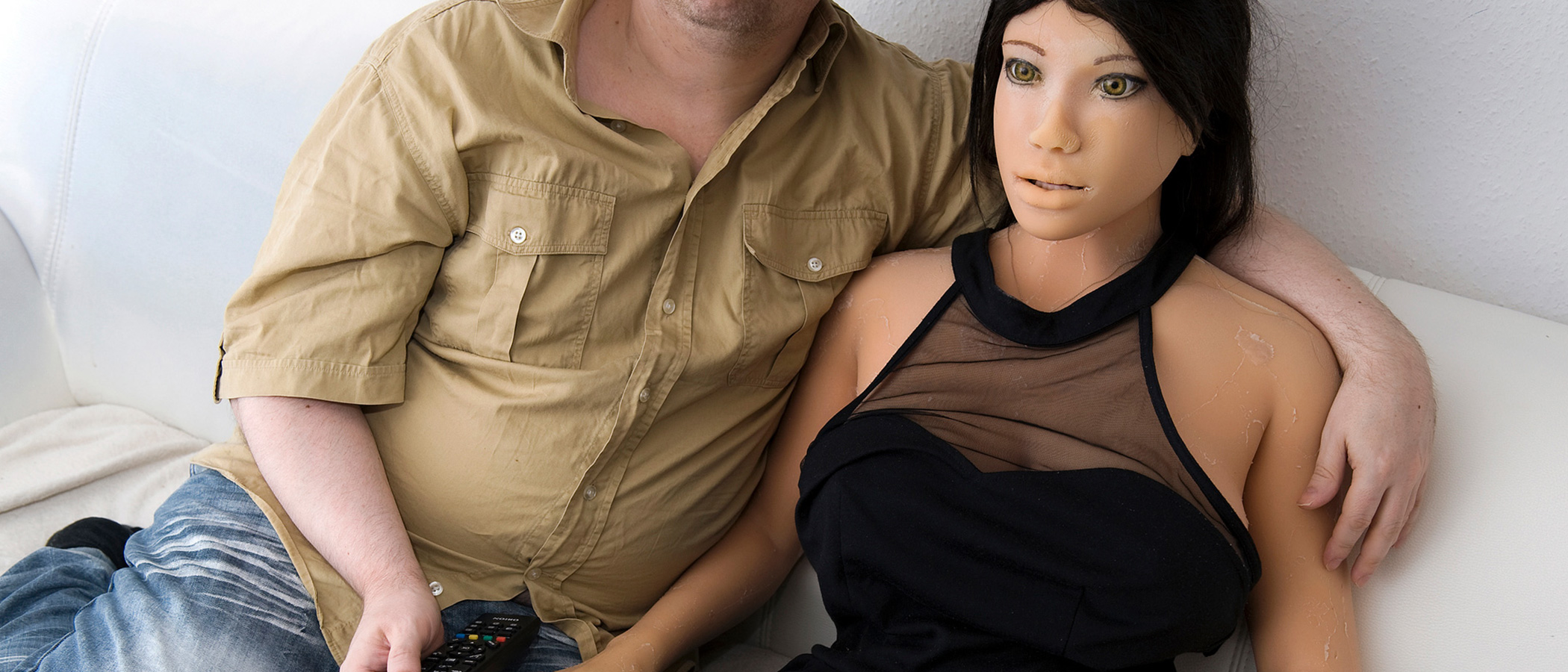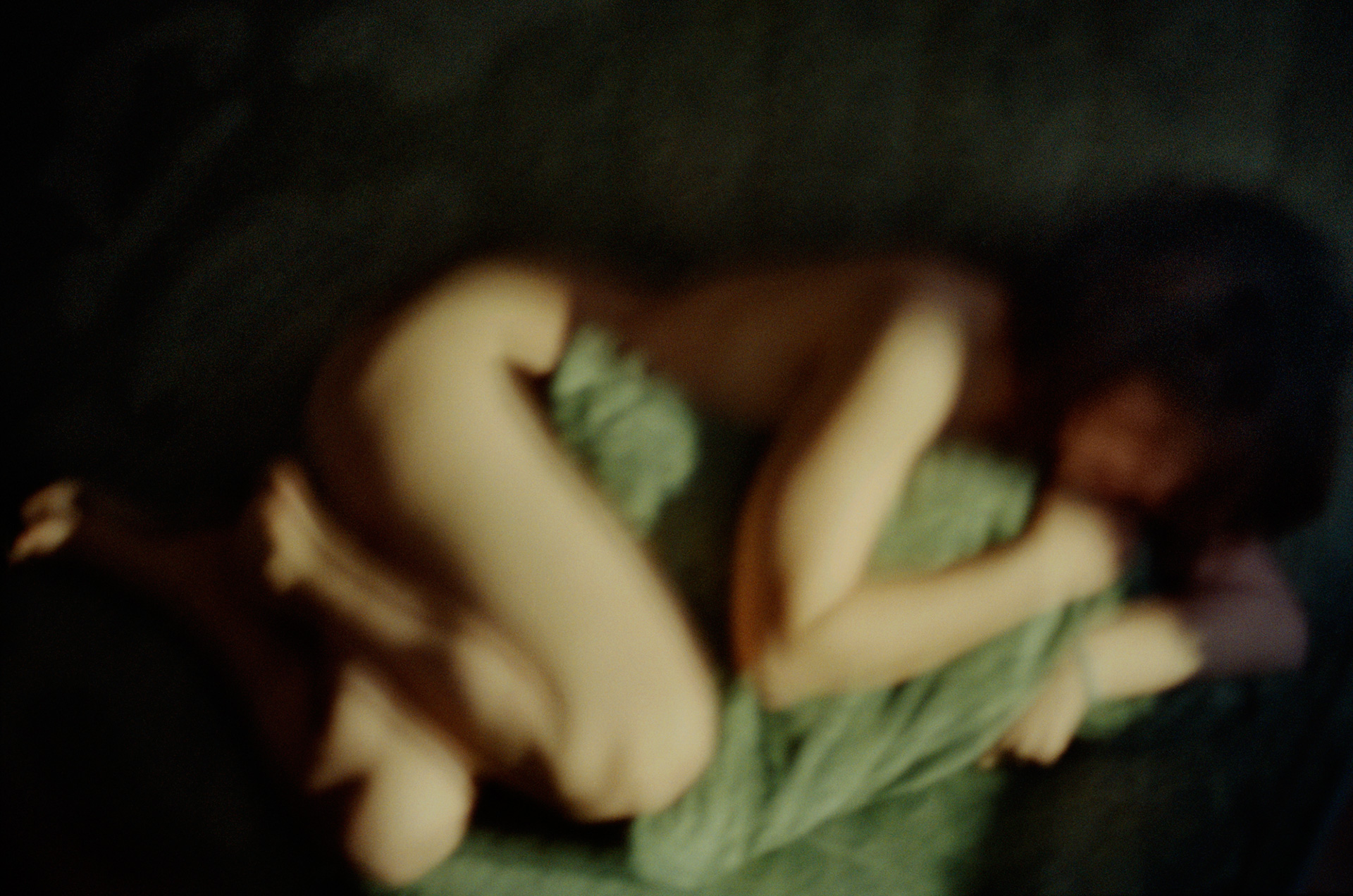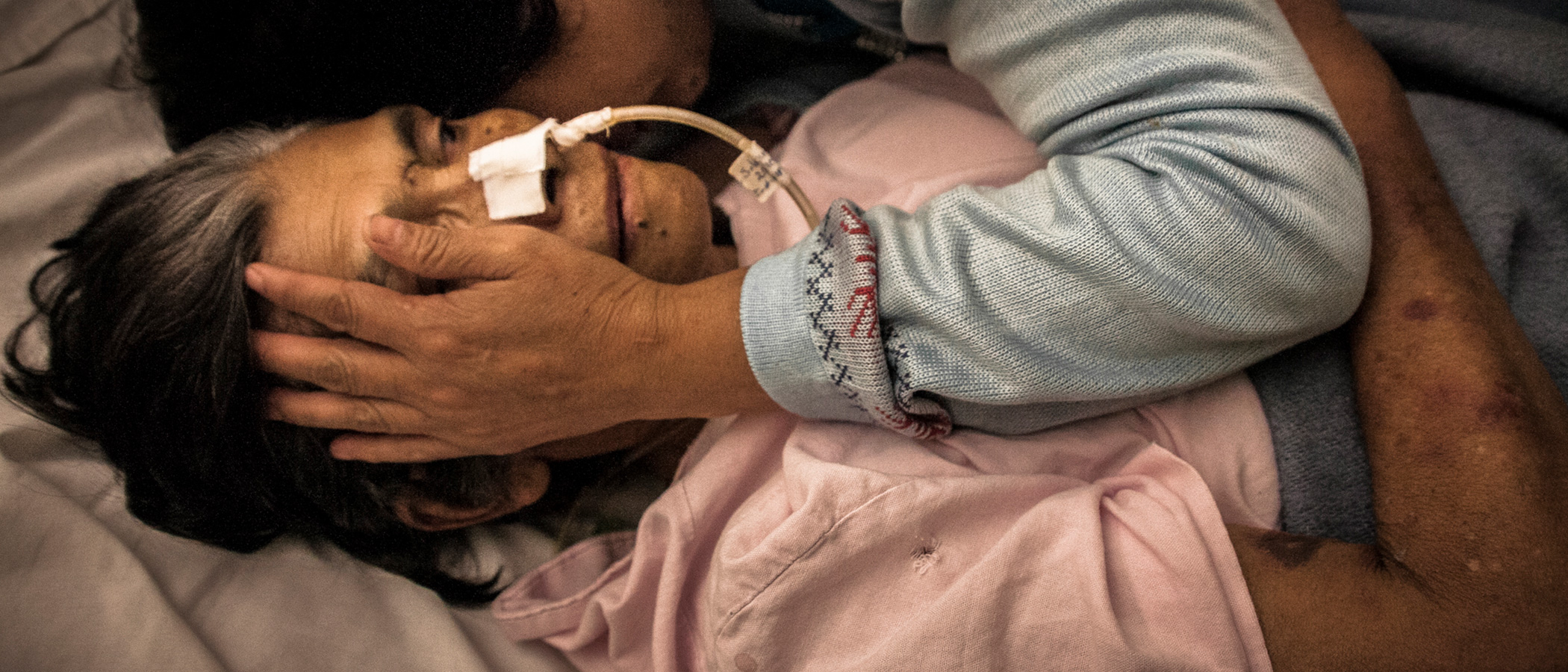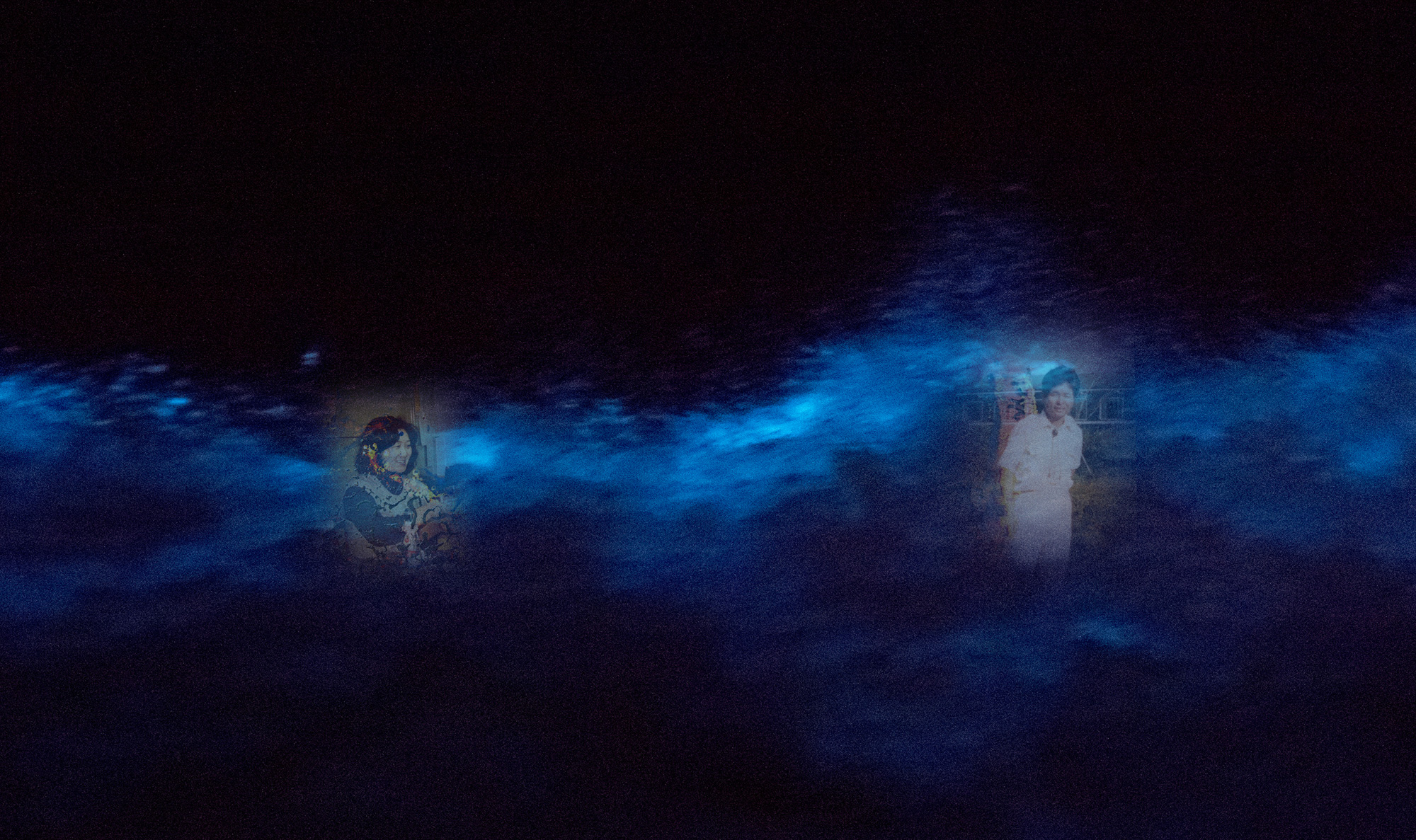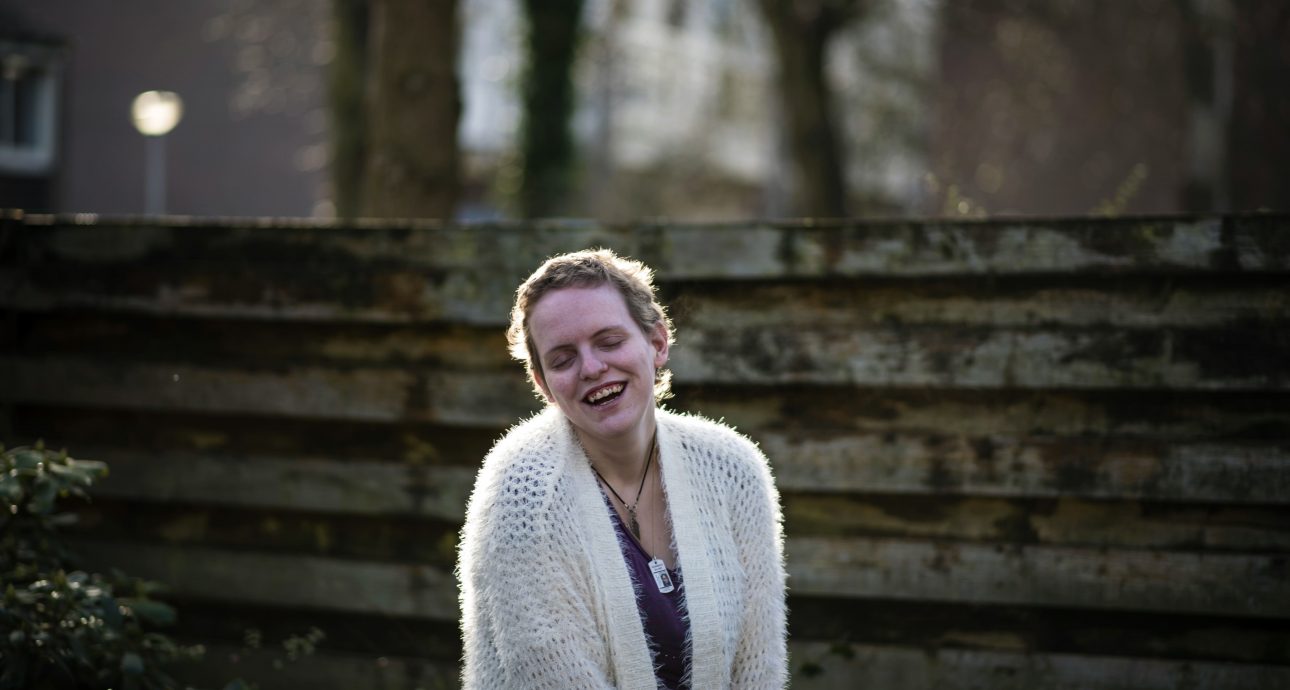
She Would Love To Live: The Last 26 Days Of The Life Of A Woman Who Chose To Have Euthanasia
Euthanasia, also called mercy killing, refers to the administration of lethal medication to an incurably suffering person. It is reserved for patients with unbearable and untreatable physical or mental suffering. Today, euthanasia is legalized in several European countries, including the Netherlands, Belgium, Luxembourg, Switzerland, Germany, Canada, Israel, one state of Australia, eight states of the United States, and Colombia.
It is essential to say that euthanasia can be passive (“unplugging” the patient from an artificial life maintenance machine) and active (the patient receives a lethal injection). Voluntary euthanasia is done on terminally ill patients that are conscious and have repeatedly voluntarily expressed a desire to die in this way. Involuntary euthanasia is performed on people unable to communicate like vegetative or coma patients by consent of those closely related to them.
One type of active euthanasia is physician-assisted suicide (PAS) or voluntary active euthanasia. In this case, the physician’s assistance is usually limited to prescribing a lethal dose of drugs, while the patient themselves performs the action that takes the patient’s life (e.g., a lethal injection).
Advocates of euthanasia often oppose the word “suicide.” They argue that, as people have the right to live with dignity, they also have the right to die with dignity when suffering is unbearable and there is no chance of recovery.
Advocates of euthanasia often oppose the word “suicide.” They argue that, as people have the right to live with dignity, they also have the right to die with dignity.
In Ukraine, euthanasia is legally prohibited, and providing any assistance in dying is considered murder. In October of last year, a member of the Ukrainian parliament Geo Leros announced plans to introduce a bill allowing euthanasia in our country. But this didn’t happen until now.
The Netherlands was the first country to legalize euthanasia. In 1984, the Supreme Court of the Netherlands recognized voluntary euthanasia as acceptable; in 2002, legislation regarding euthanasia and assisted suicide became effective in the country. In October 2020, The Dutch government has approved plans to allow euthanasia for terminally ill children aged between one and 12. The change is expected to be implemented in the next few months. Euthanasia is currently legal in the Netherlands for adults, children older than 12 (with mandatory consent from the patient and their parents), and babies up to a year old (with parental consent).
Meanwhile, foreigners can undergo euthanasia only in one country — Switzerland, which has become known as a destination for “suicide tourism.”

German photographer based in Hamburg. Studied photography at the Hamburg University of Applied Sciences. Member of LAIF photo agency since 2007. Winner of World Press Photo, Magnum Photography Awards, Sony World Photography Awards, Prix de la Photographie Paris, LensCulture Portrait Awards, MIFA, and many other photography awards.
— I started this project in July 2017. In a group on Facebook, I met both terminally ill people and those fighting to legalize euthanasia. By the way, both of these categories are equally important to me; I do not even separate them. I decided to reveal the topic of euthanasia through the personal history of Aurelia.
Euthanasia is the intentional termination of life to alleviate the suffering of an ill person. Euthanasia is performed by lethal injection, allowing to calmly and peacefully end a patient’s life, avoiding unnecessary pain and suffering.
Each country has its laws on euthanasia. I know this is a delicate topic, but it needs to be discussed. With the 26 Days project’s help, I want to focus on it and involve the audience in the discussion.
First, I researched the topic to learn more and get closer to terminally ill people who would allow me to photograph them at the decision-making stage and until they are euthanized. Before I met Aurelia, I didn’t even know that euthanasia is possible not only for the physically ill but also for those who struggle with mental illness.
Aurelia was physically healthy; she was still able to live on for a long time. But she suffered from severe mental illnesses. Aurelia had (among other chronic diseases) borderline personality disorder, depression, various anxiety disorders, eating disorders.
When she had seizures, she could put broken glass into her body, squeeze cigarettes on her arms, and spray deodorant in her eyes. Since she was 21, she tried to commit suicide several times. She said, „In my head, there is a monster that sticks me with a hundred knives.“ She tried to fight against her illnesses for many years. She made all possible treatments and therapies to no effect.
Aurelia suffered from severe mental illnesses. She had (among other chronic diseases) borderline personality disorder, depression, various anxiety disorders, eating disorders.
Aurelia was very active on social media. She advocated for euthanasia for psychiatric patients whose suffering is unbearable and hopeless. She wanted to tell her story, hoping for a greater understanding of the importance of euthanasia for such patients.
I immediately told Aurelia that I would like to visit her and document the last weeks of her life. Of course, I was surprised at how quickly she agreed. At first, I was a little worried that such a quick agreement could be due to her illness and that she did not fully realize that I really wanted to spend the last weeks of her life with her. We immediately agreed that if we did not like each other, we would cancel all agreements at any time.
Aurelia often mentioned her mother, who died exactly one year before her daughter was to undergo euthanasia. She said that her mother’s death did not affect her desire to die. Aurelia’s parents had known for a long time about their daughter’s intention to end her life and did not want her to feel guilty about it. The desire to undergo euthanasia was perhaps the strongest in her life, and, of course, they did not like it. But Aurelia said that they allowed her to end her life with dignity. She felt calmer because her father would no longer be afraid to see police officers on the threshold of his house with the news of his daughter’s suicide.
She felt calmer because her father would no longer be afraid to see police officers on the threshold of his house with the news of his daughter’s suicide.
I had no doubts about the project, but certainly, I felt responsible for where and how it would be published. In the media, suicide is reported just in a few cases, for a good reason: to prevent further suicides. The context is essential here; otherwise, people can easily misunderstand this situation. For example, this could happen if somebody published images and quotes of Aurelia without her full story.
While filming the project, I lived in Aurelia’s apartment and slept on a sofa in her living room. On some days, we were together 24 hours; on others, she had less time, as she was busy preparing her funeral. Sometimes she sat at the computer a lot or met with journalists.
Aurelia said, „I would love to live, but I want to end my suffering!“ She simply did not find a way to live. Until the last day, it seemed like a faraway threat that she would die. It was difficult for me to accept her desire.
Aurelia said, „I would love to live, but I want to end my suffering!“ She simply did not find a way to live.
A day before she died, she invited her best friends to a home dinner to say goodbye. It was more like a birthday party. Everyone was laughing, chatting, and joking a lot. After the guests left, Aurelia took sleeping pills and fell asleep on the sofa in the living room. Her friend and I stayed overnight to look after her. The next morning, paramedics arrived and prepared her vein for injection – in case, after taking the drug, she would vomit (sometimes the body reacts like that) and then decide to give herself an injection. That was the moment when I finally realized that Aurelia was going to die very soon.
She said: “I am able to love and have fun sometimes, but I am not able to live without pain. I still enjoy music, be together with friends, enjoy my hobbies. People think if I can still enjoy that, I can also live if I just want. But that is not true.”
Sometimes I found it difficult to cope with her changeable mood, especially when she hurt herself. One day Aurelia told me: “Sandra, I want to hurt myself. You can stay in the living room or go out and not see it. Just don’t try to stop me.”
I stayed in the room with her. This time she slowly squeezed cigarettes on her arm. It was scary just to watch it not being able to stop her or help in any way.
Every day, I was afraid that she would not leave the bedroom because she took her own life at night. During the second week, it was awful, she was losing patience, and it became increasingly difficult for her to wait for the day of euthanasia. One morning she said that she was grateful to me for being there; otherwise, she would have tried to commit suicide again.
My project shows a young woman who chose euthanasia, but you cannot say that it popularizes euthanasia. I have already received many letters, but they were all positive. Opponents of euthanasia still haven’t written to me. And yes, my project does not romanticize euthanasia, as Aurelia herself did not romanticize it. This story should not advertise death as the only appropriate decision.
My project does not romanticize euthanasia. This story should not advertise death as the only appropriate decision.
A dignified death is what Aurelia wanted. As she said, „It’s my life, my pain, my decision, my death.” The reasons are always individual. We just need to respect them. It is a pity that there are no adequate laws on euthanasia in many countries, and if they do exist, they exclude mentally ill people.
I know that it can be difficult for healthy people, including me, to realize this. I think that after spending the last weeks with Aurelia, I began to understand her much more. But no one can fully feel the pain of another.
In the case of Aurelia, it was a very balanced decision: she fought for her permission to die for eight years. Aurelia described her illness as invisible cancer. “If people with cancer are allowed to die, why not me, too?“ It’s a question she used to ask herself a lot.
Although euthanasia is legal for mentally ill people in the Netherlands, doctors allow it on very rare occasions. The difficulty also lies in the fact that it is necessary to exclude the spontaneity of the decision in mentally ill patients. Doctors need to be sure that a person with a mental disorder consciously makes this choice and that this is not a momentary outbreak.
In 2012, Aurelia’s request for euthanasia was rejected because she had not tried all possible treatment options yet. She talked to doctors and psychologists, filled in forms, and took medical records. On the 31st of December 2017, Aurelia received a phone call from the euthanasia clinic: she was allowed to die in 26 days. This time, the doctors were convinced that Aurelia`s fight for healing was without any prospect of success.
There is a big difference between suicide and euthanasia. But this is a tricky area. If I talk about this difference, it will look like I want to promote euthanasia. Suicide often occurs due to a momentary flash of consciousness; this is a very spontaneous decision in many cases. Besides, suicide may cause significant harm to other people (depending on the method). Think about it – someone’s life can be transformed forever after they become unwitting witnesses to your death. The corpse can be found by a train conductor or members of a volunteer fire department, who will have to collect body parts; people passing by a tall tower can also be involuntarily involved in someone else’s death.
Aurelia said that the last thing she wanted was to trigger people to kill themselves. She wanted that those who really want to end their lives because of suffering would get the chance to die self-determined and supported by a doctor. Not alone, not after a self-mixed overdose, not after a jump in front of a train, not after a jump from a high building. But at home, in their bed, surrounded by their loved ones and with dignity.
She wanted that those who really want to end their lives because of suffering would get the chance to die self-determined and supported by a doctor.
While filming this project, I wanted to understand Aurelia’s pain, her suffering. In general, I think that photographers need to care about those they picture; they need to understand people and empathize with them. At the same time, you must not forget that this is a job, and therefore it is important to establish the right emotional distance. It was a very stressful few weeks. I laughed and cried so much together with Aurelia.
After the project ended, I felt exhausted. I suddenly realized that I need to take more care of myself when I cover stories like this. Aurelia’s voice is often heard in the film produced as part of the “26 Days” project. It is still hard for me to listen to it. I miss her. After the death of Aurelia, I could not start editing the footage for a whole month.
I think that photographers need to care about those they picture; they need to understand people and empathize with them. At the same time, you must not forget that this is a job.
Aurelia was angry with people who oppose euthanasia because of their religious beliefs. She considered herself an evangelical Christian and was sure that God loved her. Here are her words: “Everyone understands the Bible in their way. Is the ban on euthanasia about the love of God? They say that I will go to hell if I die by euthanasia. I don’t believe in hell after death; it doesn’t exist. I believe that God will receive me with open arms. Hell? That is what earth means to me.”
When she wrote on Facebook that she was going soon to her dead mother, someone responded: “You do not go to your mother, you go to hell!” Aurelia sincerely didn’t understand why these people were so nasty to her if they considered themselves religious. I think it is high time for the church to reconsider many of its views.
Aurelia gave me permission to photograph her during the euthanasia. But I decided not to do this, not to film the moment of her death. I was there by her side as a friend. I cannot describe what precisely I was thinking and experiencing at that moment. Of course, I was sad, I felt exhausted, but at the same time, I was calm because everything went well. She did not vomit after taking the medicine; she left quietly and peacefully.
I decided not to film the moment of her death. I was there by her side as a friend.
During filming, I worked to my limit. For the first time, I accompanied someone until their death. And it was definitely a strong emotional experience.
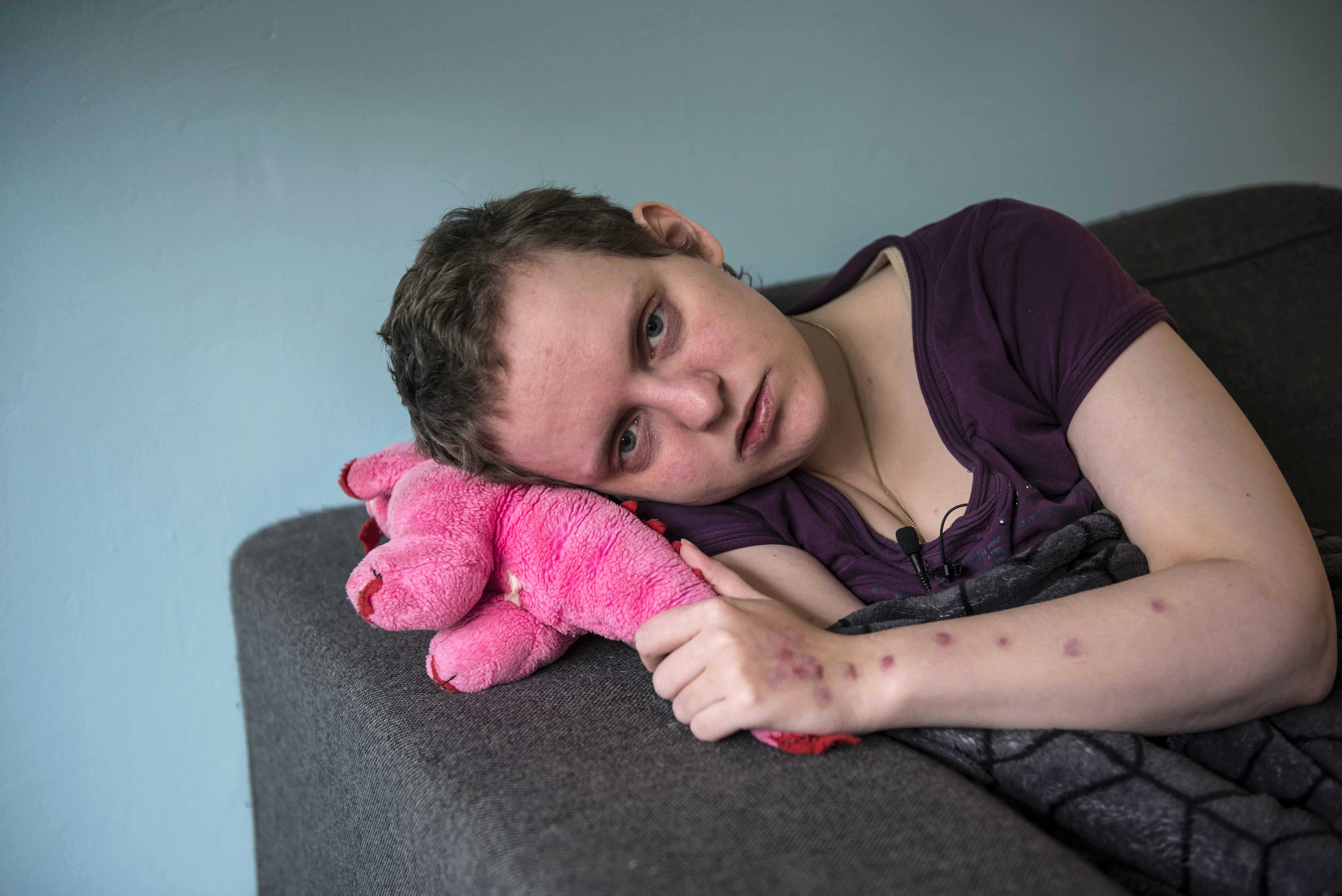
Aurelia poses for a portrait. „In my head is a monster which sticks me with hundred knives. I fight 24 hours a day not to hurt myself. Not to damage myself. The only thing I think about is let this be over!“
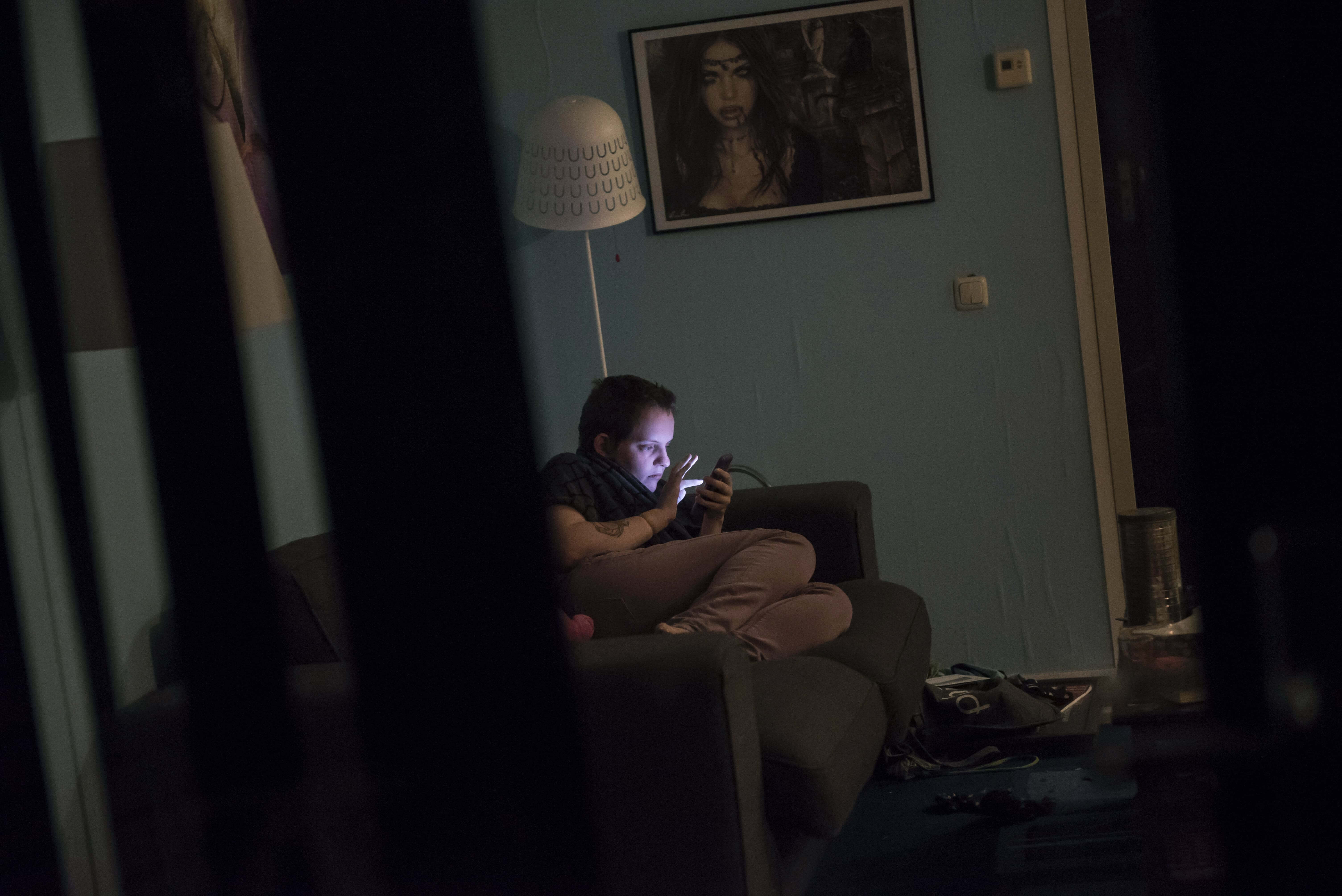
Although legal euthanasia is possible for psychiatric patients in the Netherlands, it is difficult. Through social media and her own blog Aurelia fights for euthanasia for psychiatric patients whose suffering is unbearable and hopeless. She considers this to be her ultimate life’s work in her final weeks of being alive
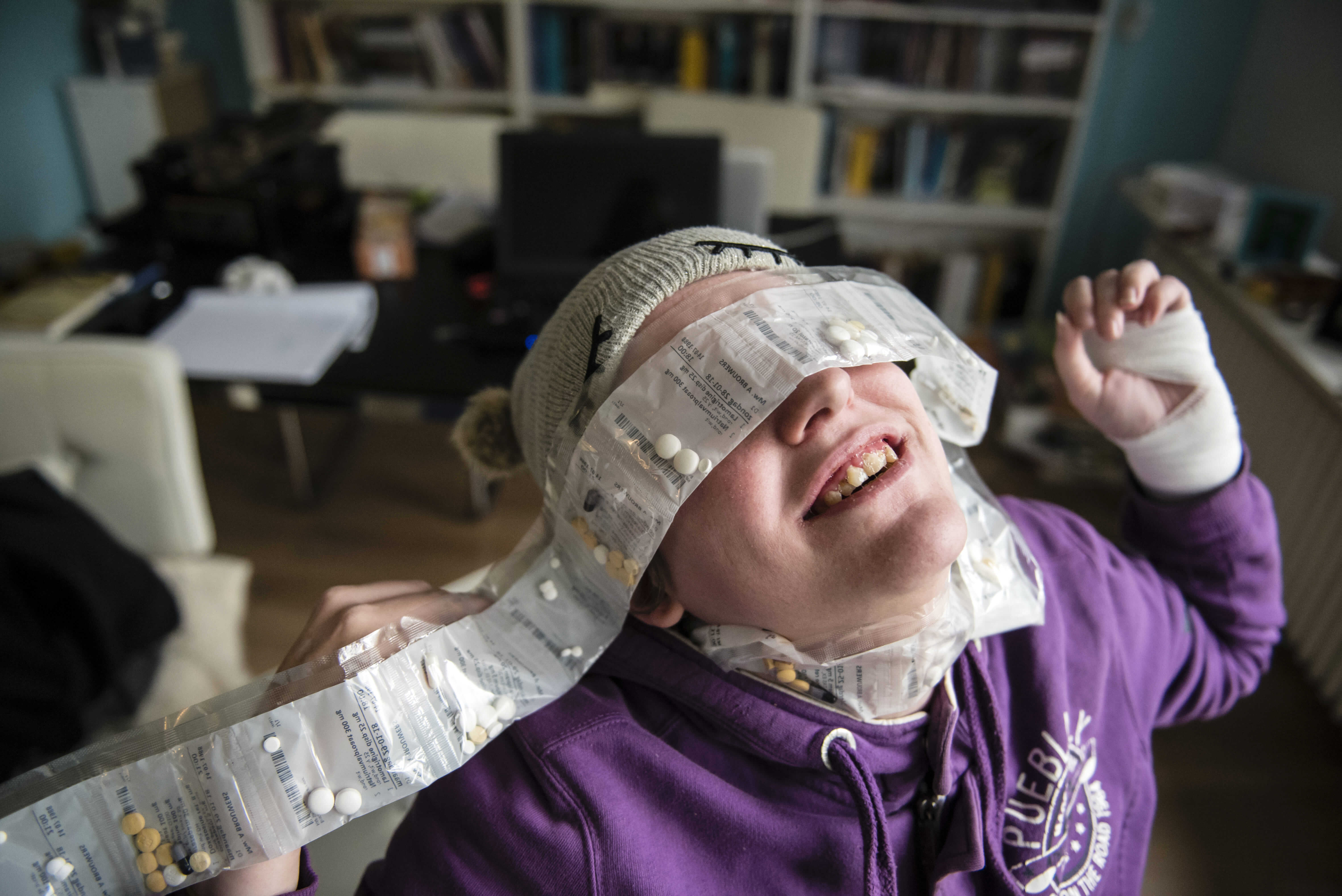
Aurelia plays with her medicine. „I am the queen of the pills,“ she laughs. Aurelia has to take around 22 tablets each day, but she rarely takes all. She collects some for the case she wants to commit suicide
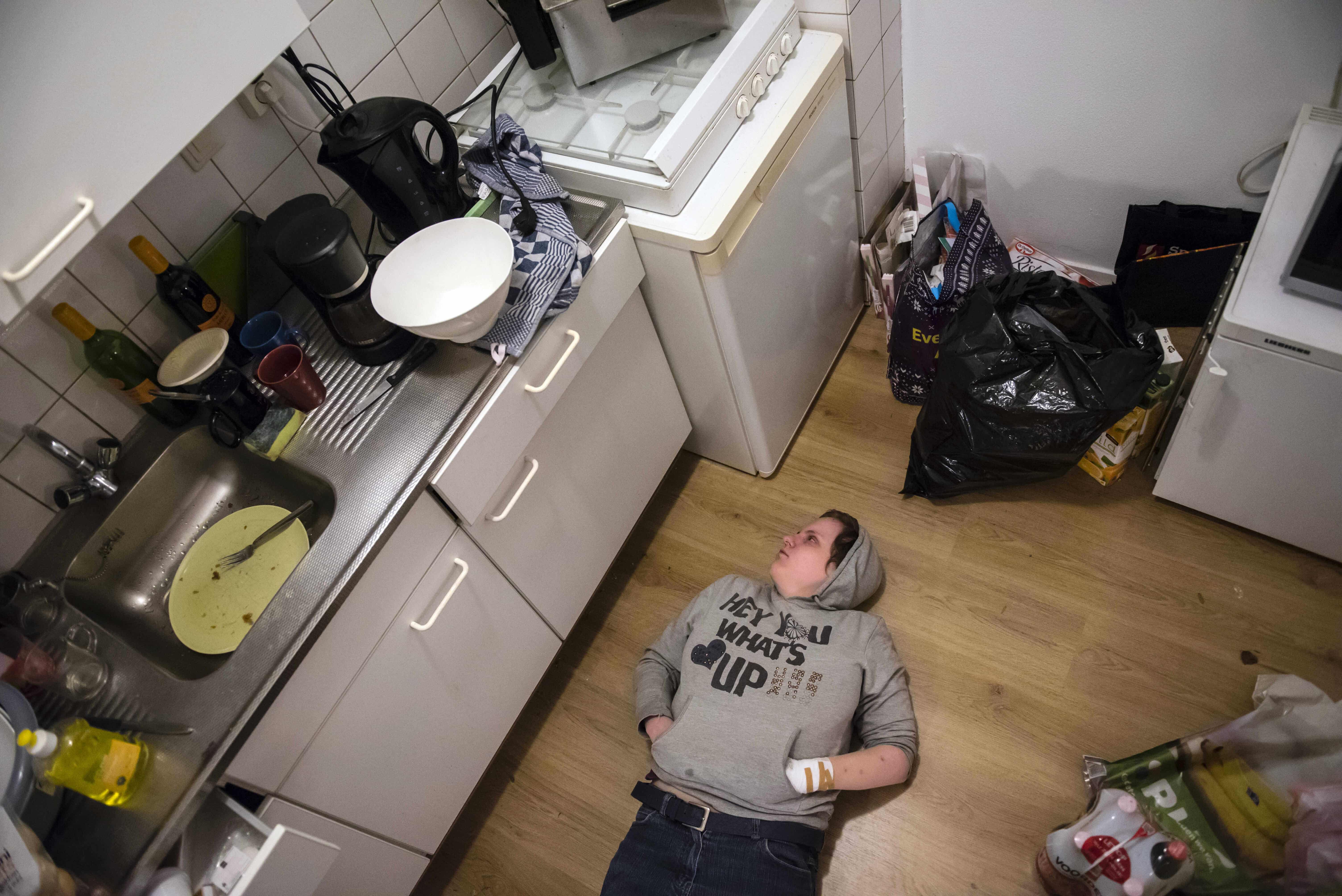
„Meanwhile I feel less physical pain afterwards, if I hurt myself. So I hurt me more and more.“ Aurelia lies on the kitchen floor after she sprayed deodorant in her eyes. „What you see is not Aurelia anymore. This is not me. This is just my illness!“
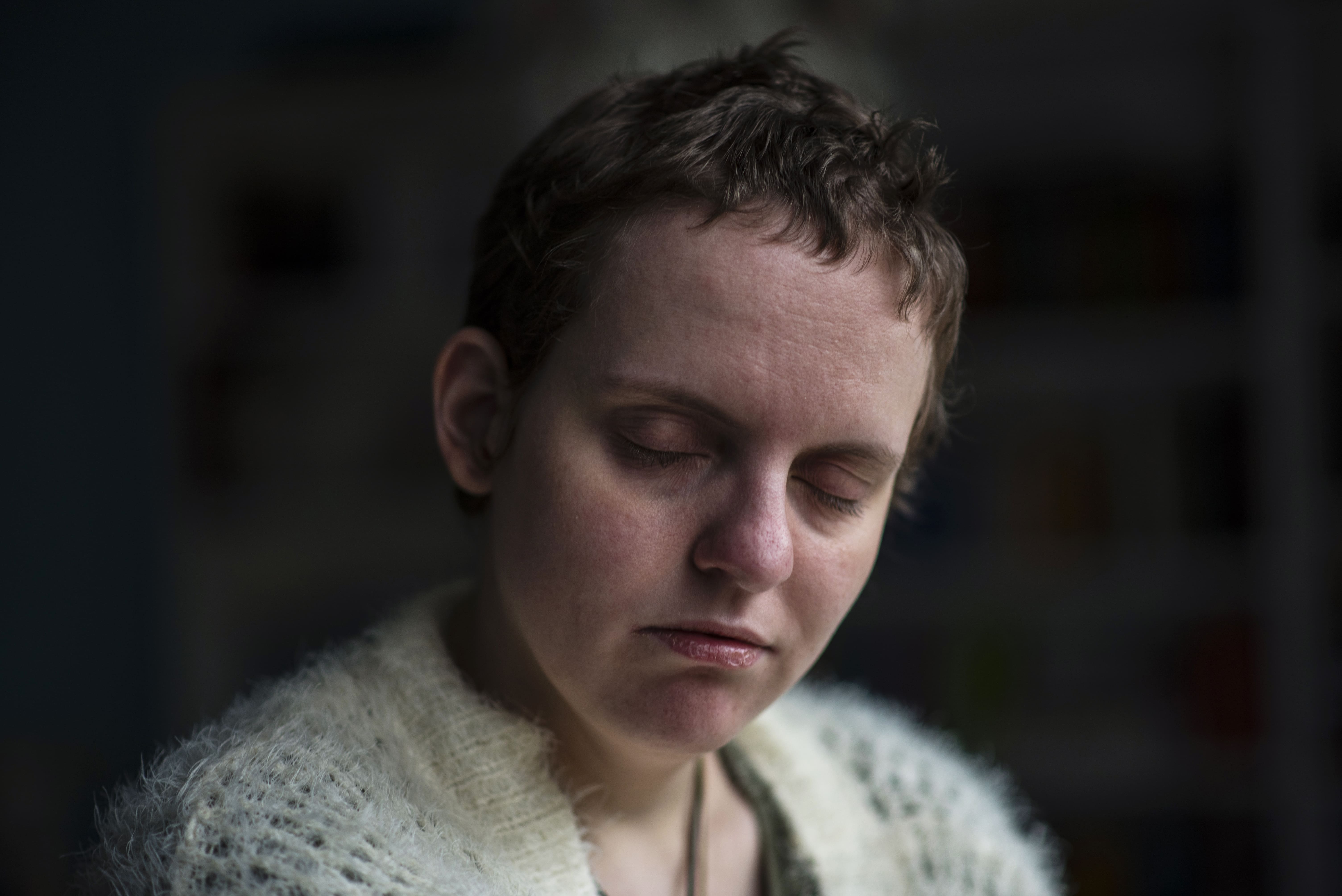
Aurelia poses for a portrait. „I want to die since 8 years now. January 26 will be my day! #finallypeace,“ she wrote on her blog some days before her death
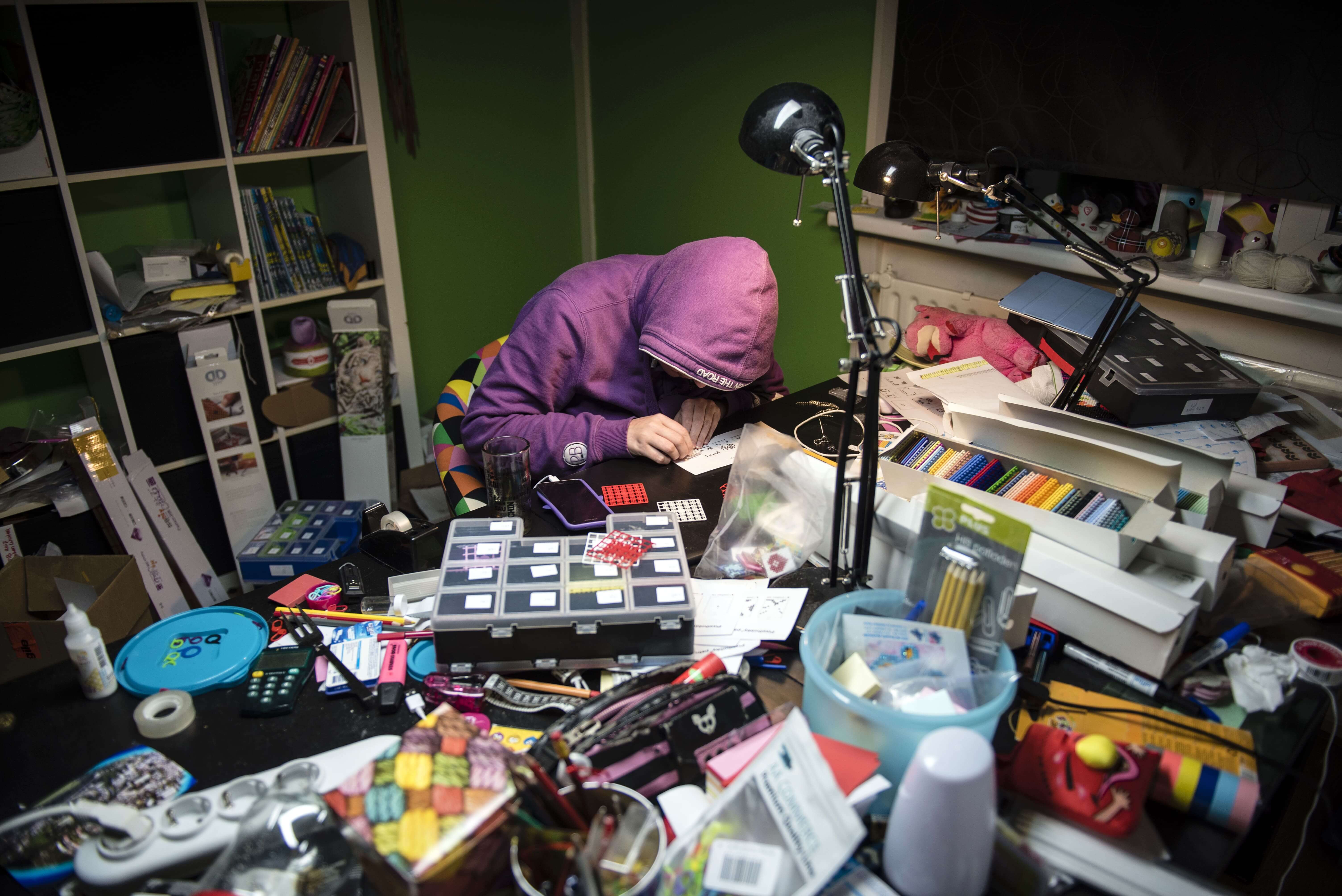
At night Aurelia works in her hobbyroom because she can’t sleep
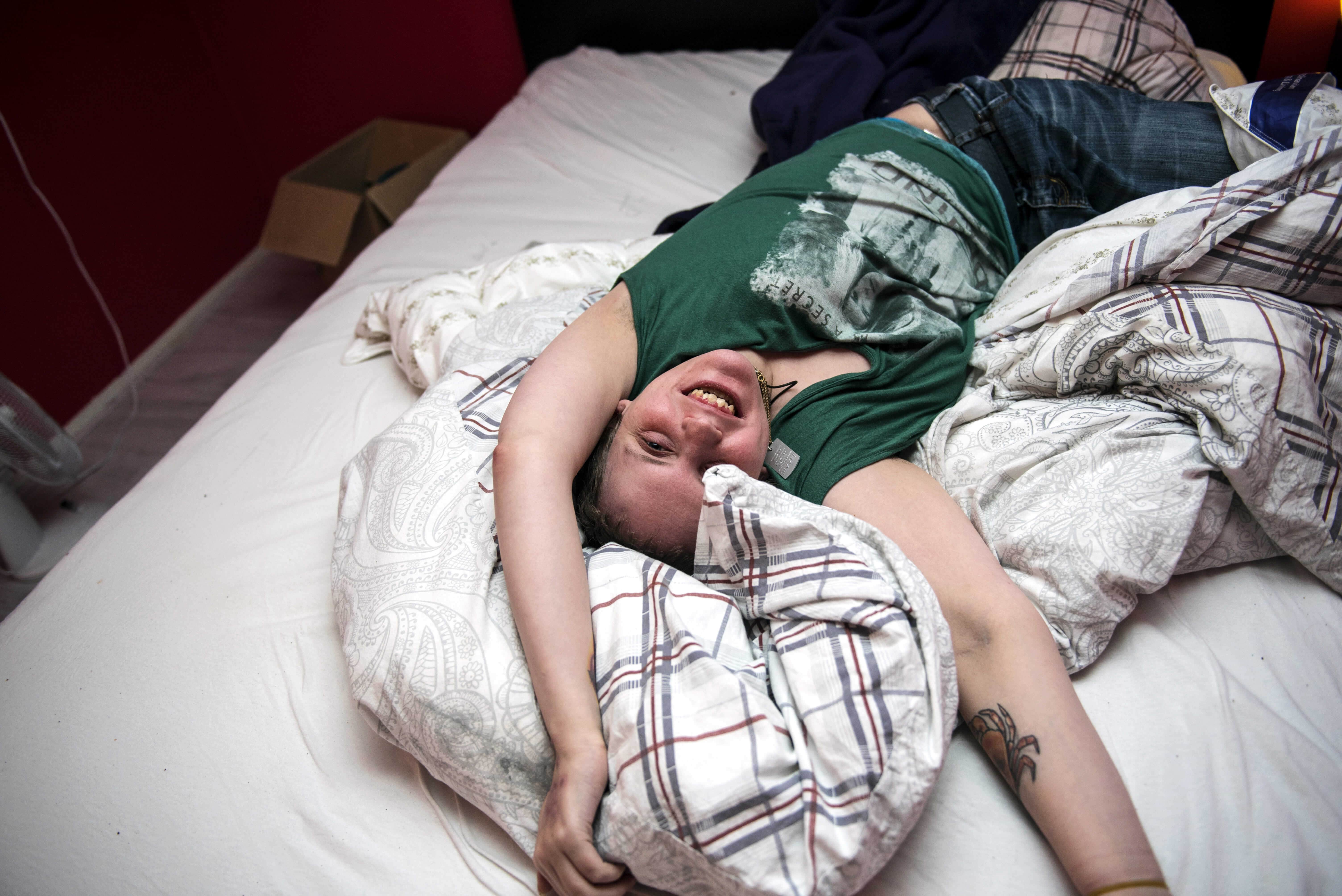
Aurelia lies laughing on her bed. „I am able to love and have fun sometimes, but I am not able to live without pain. I still enjoy music, be together with friends, enjoy my hobbies. People think if I can still enjoy that I can also live if I just want. But that is not true. I don´t live, I survive!“
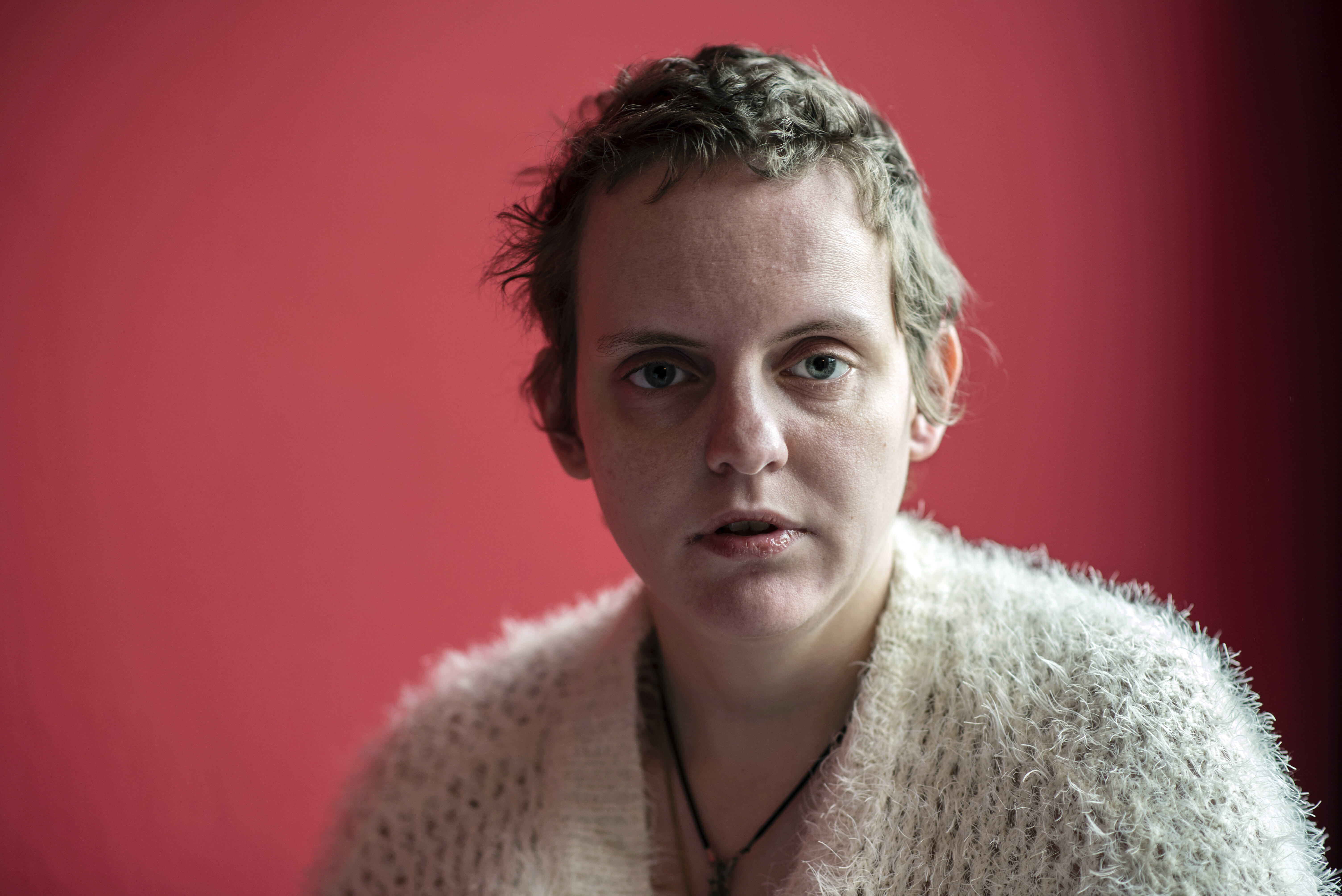
Aurelia poses for a portrait. „I don’t want to trigger people with my story. But I want to break the taboo about it and I want people try to understand. Mentally healthy people have no idea about the pain in my soul. My illness is not different than a physical illness. I am over-treated, there is no hope anymore. I want to end my suffering, I just want to die in dignity“
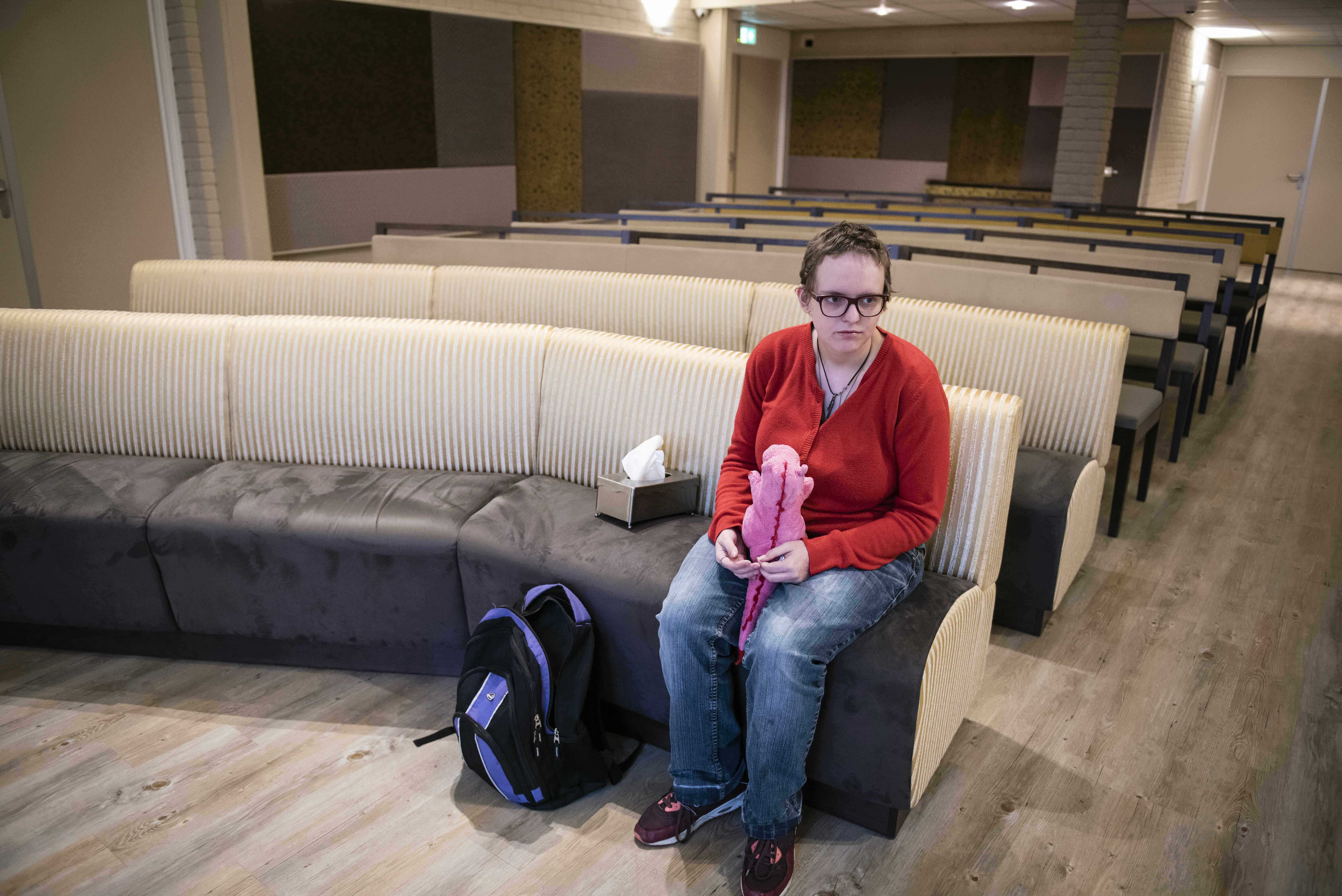
Aurelia is sitting in the crematory. She wants to see it from the perspective of her guests. This is part of her process to realize that her death is coming closer
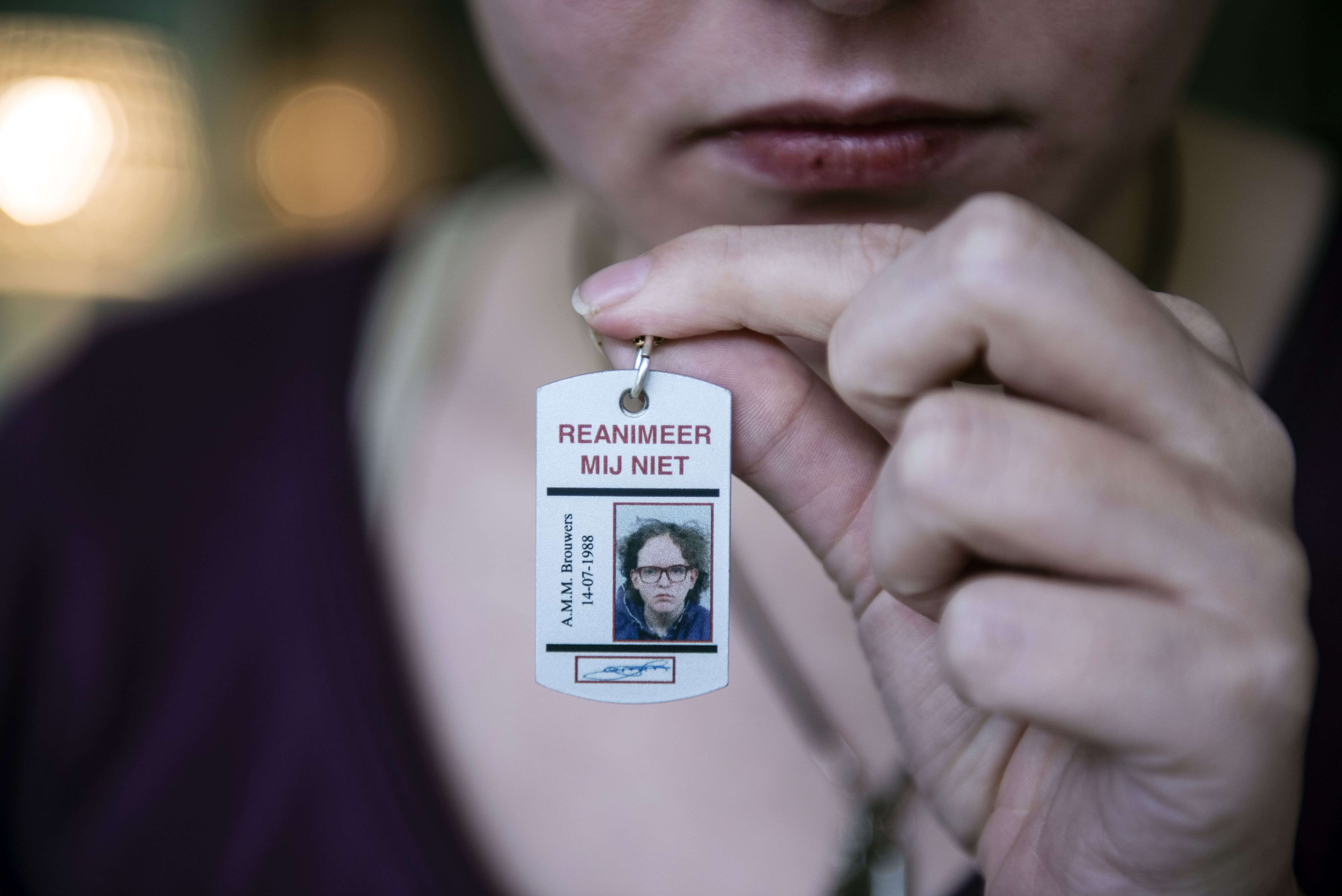
She wears a necklace with a non-resuscitation medal. But medical rescuers do not care about the non-resuscitation medal. „Do you know what is the first thing they say to me when I regain consciousness? You were a lucky girl, you survived“
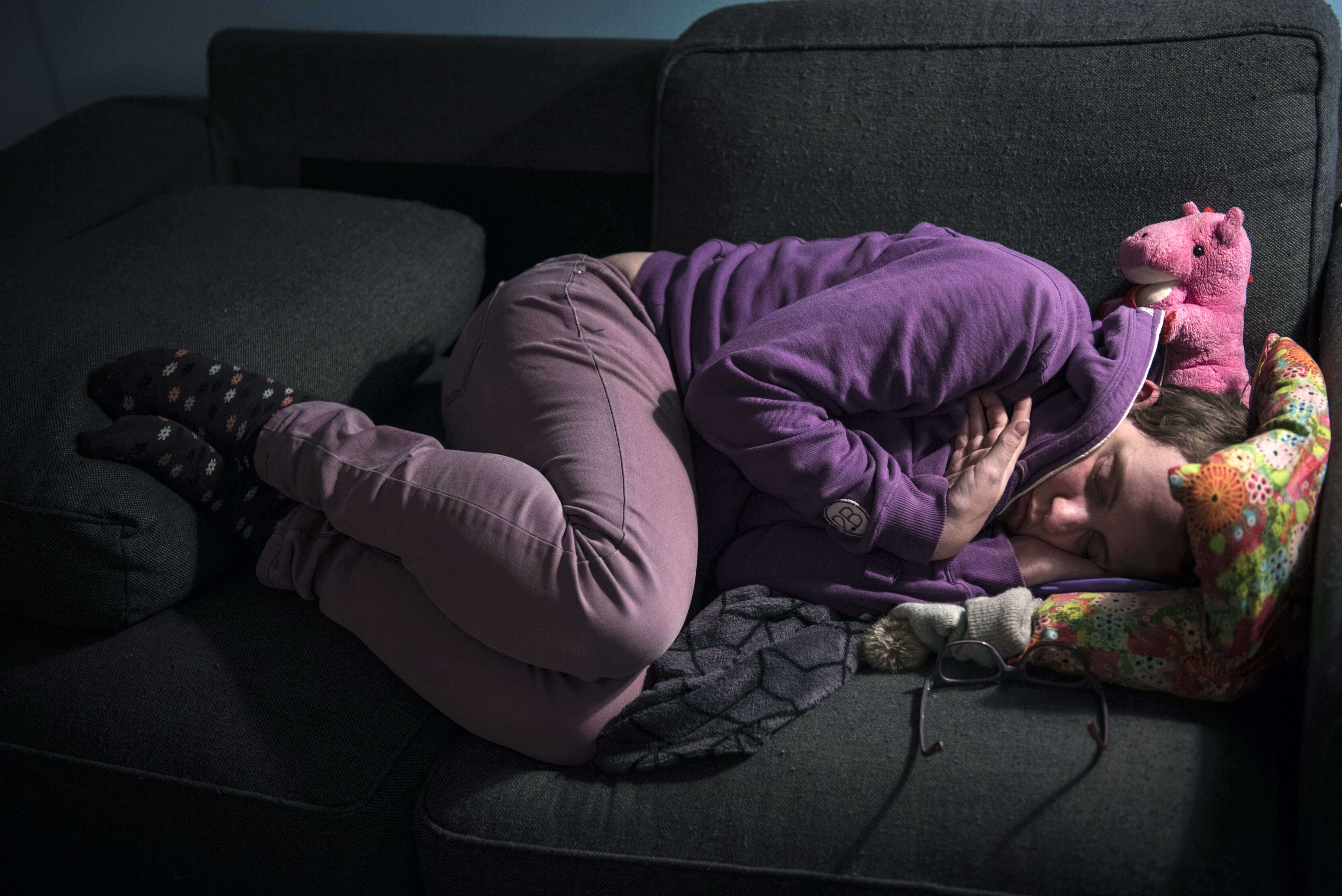
Aurelia sleeps on the couch
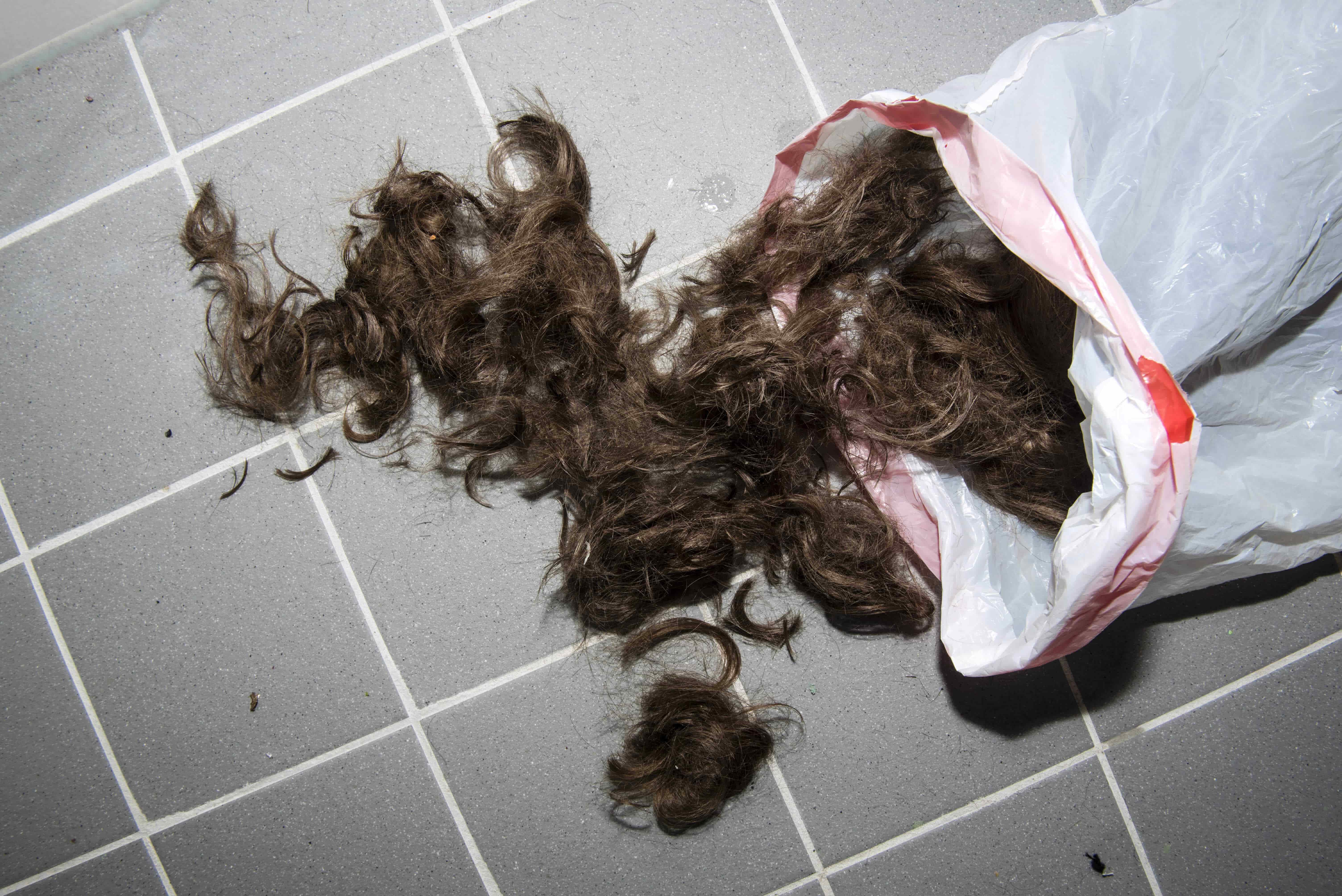
Aurelia keeps her hair in a plastic bag. One day she woke up and realized that she has cut her hair at night when she was in a dissociative state
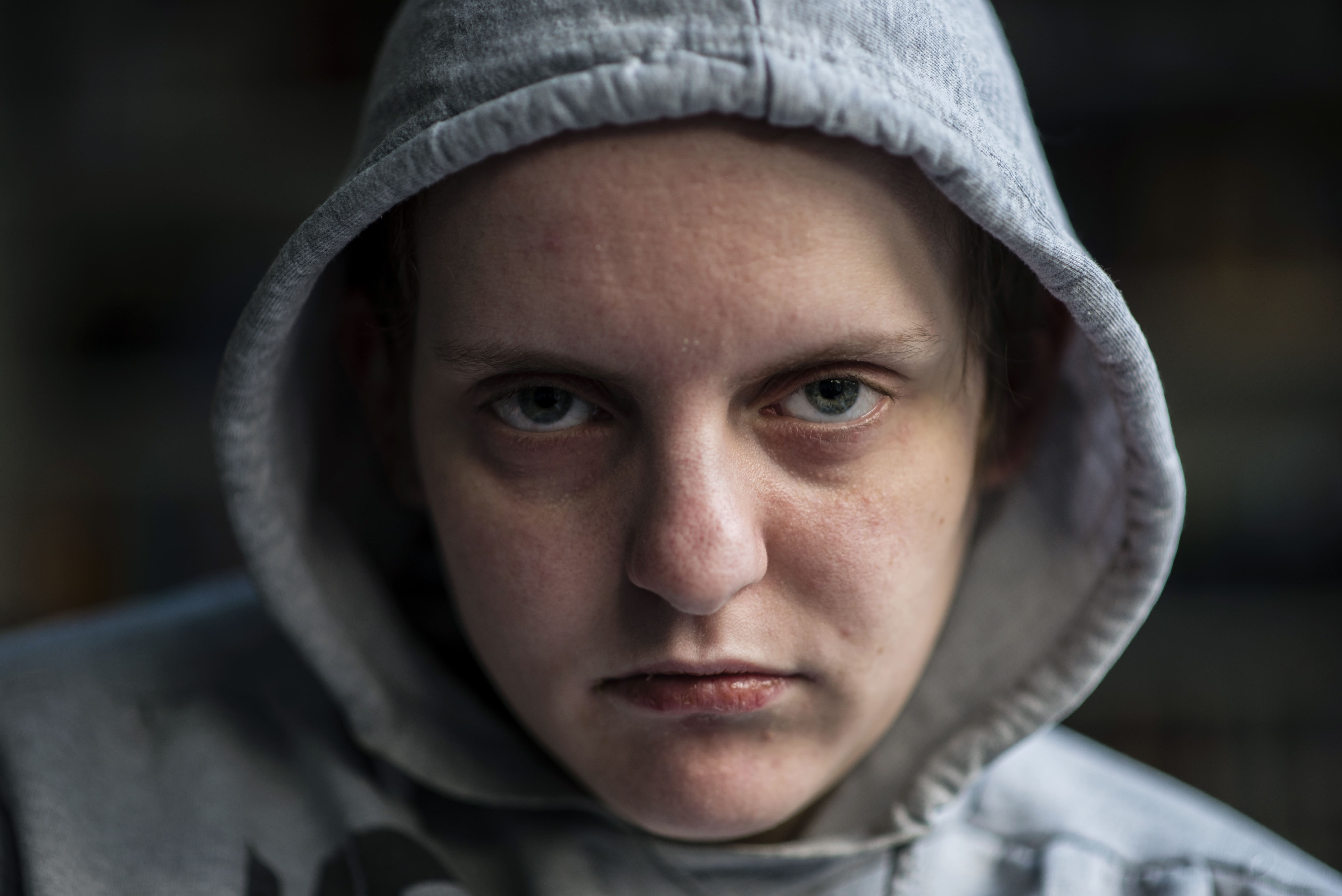
Aurelia poses for a portrait. „I am very destructive, not only to myself. I am not proud of that“
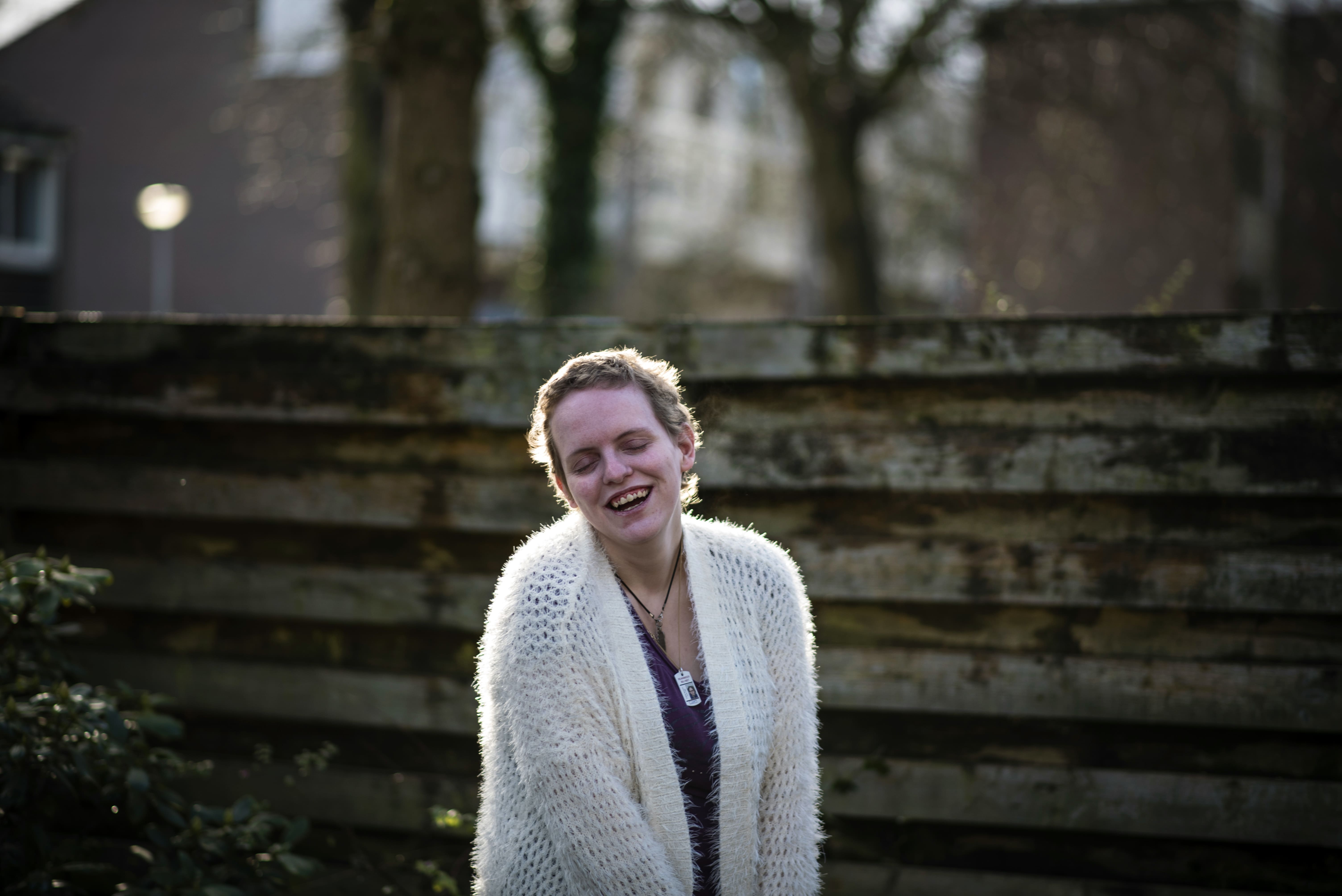
Aurelia is laughing in the garden. It is part of her illness that her mood suddenly changes
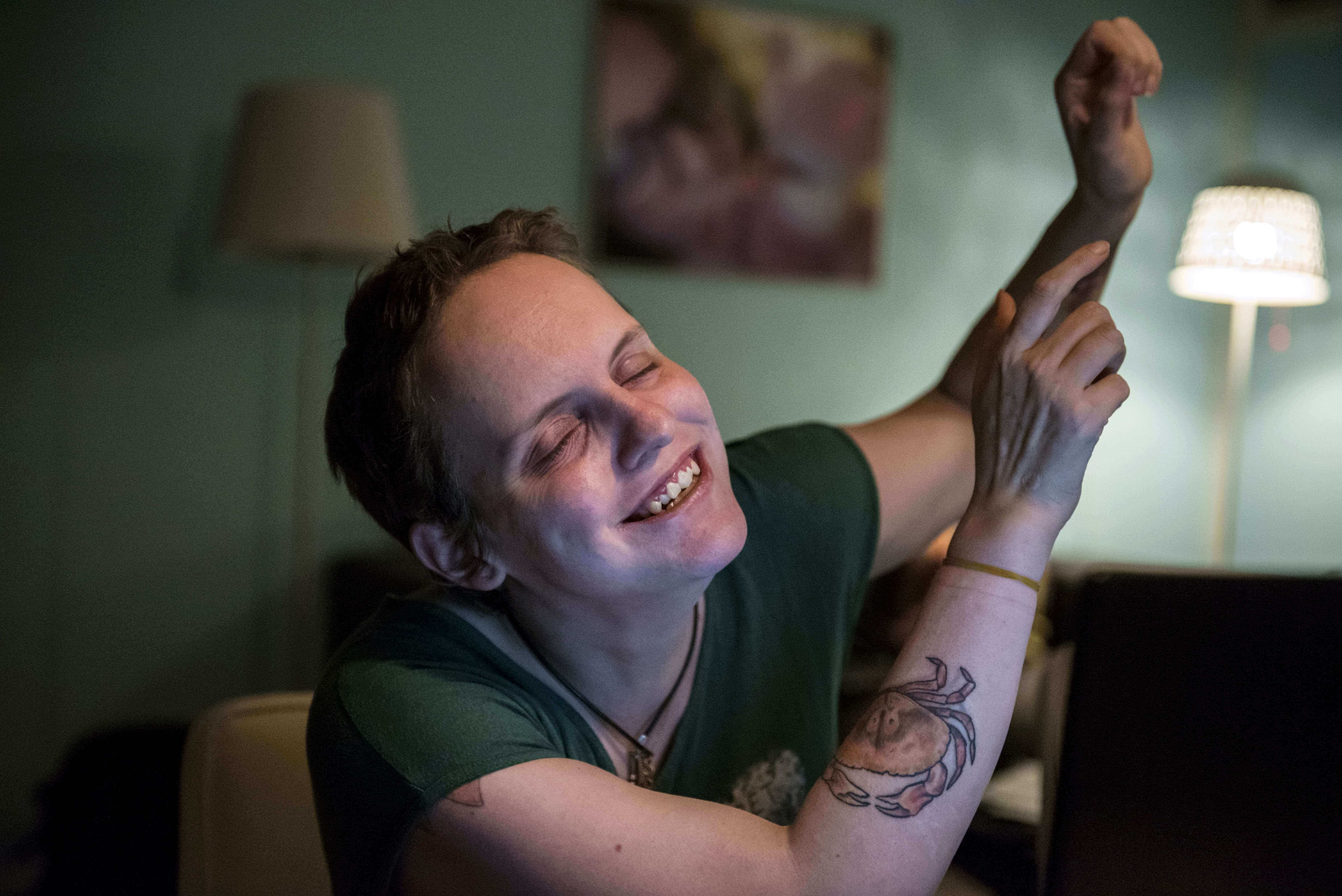
Aurelia is listening to her favorite music
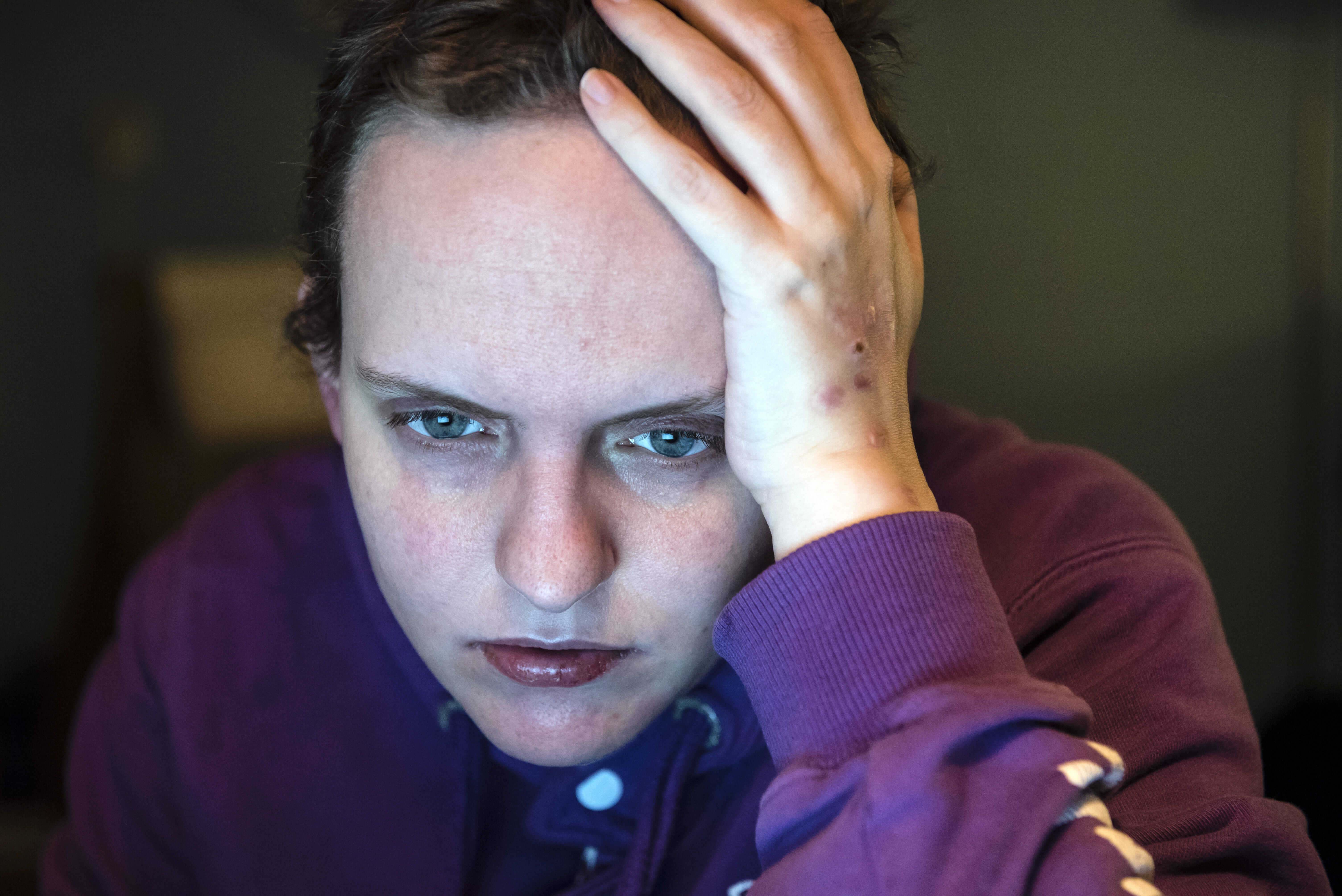
Aurelia reads her messages on the computer. „I wrote on facebook that I am going soon to my dead mother. Someone responded: „You do not go to your mother, you go to hell!“ I thought: why do you say such nasty things to me if you are so religious? I am evangelical. I know that god loves me. God is love. I don’t believe in hell after death, it doesn’t exist. I believe that God will receive me with open arms. Hell? That is what earth means to me“
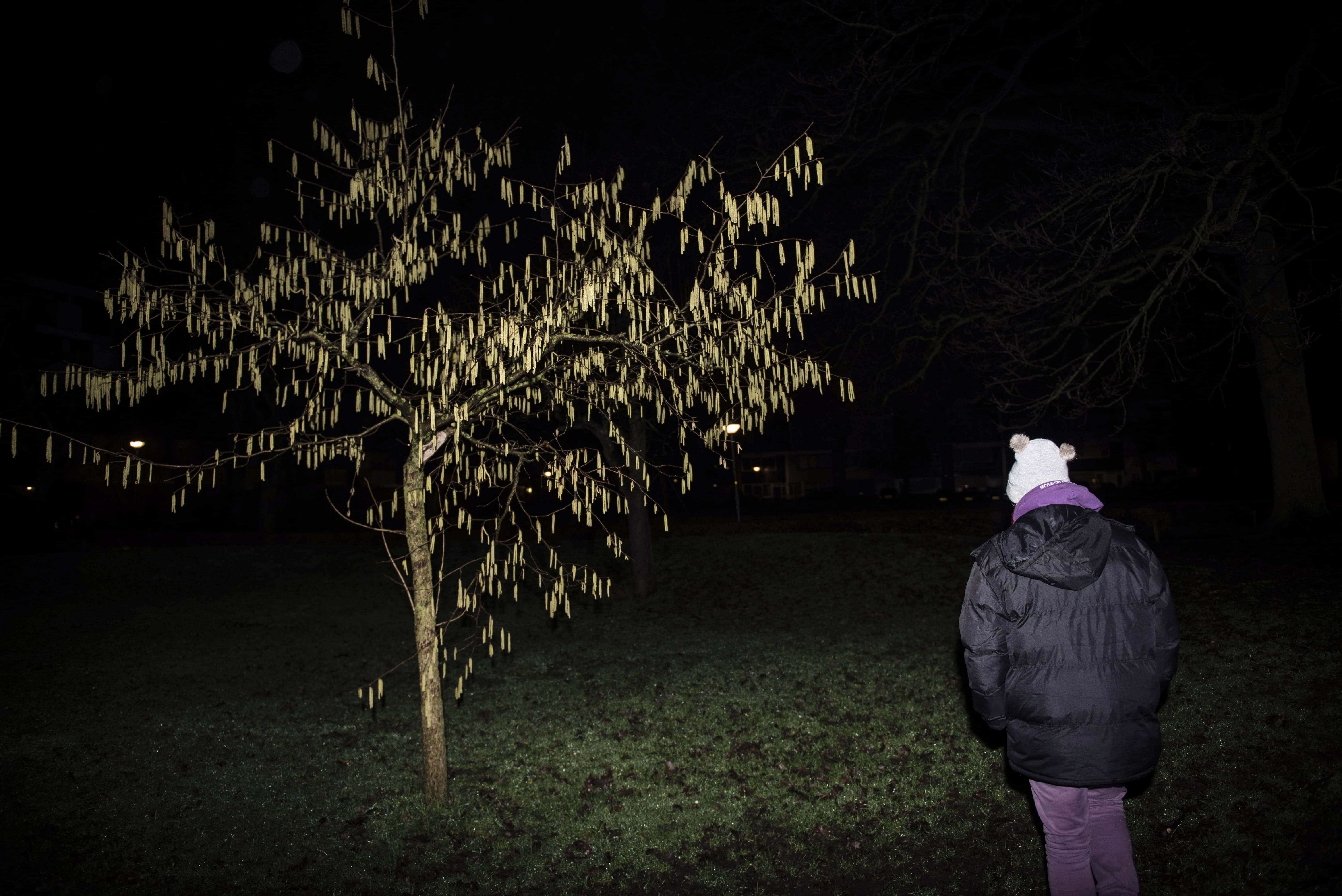
Aurelia goes out for a walk at night. „I go somewhere to clear my mind, but I get easily lost. When I am in a dissociative state I am confused and I don´t know my way back. Then I lie down to sleep somewhere until people call the police to bring me home“
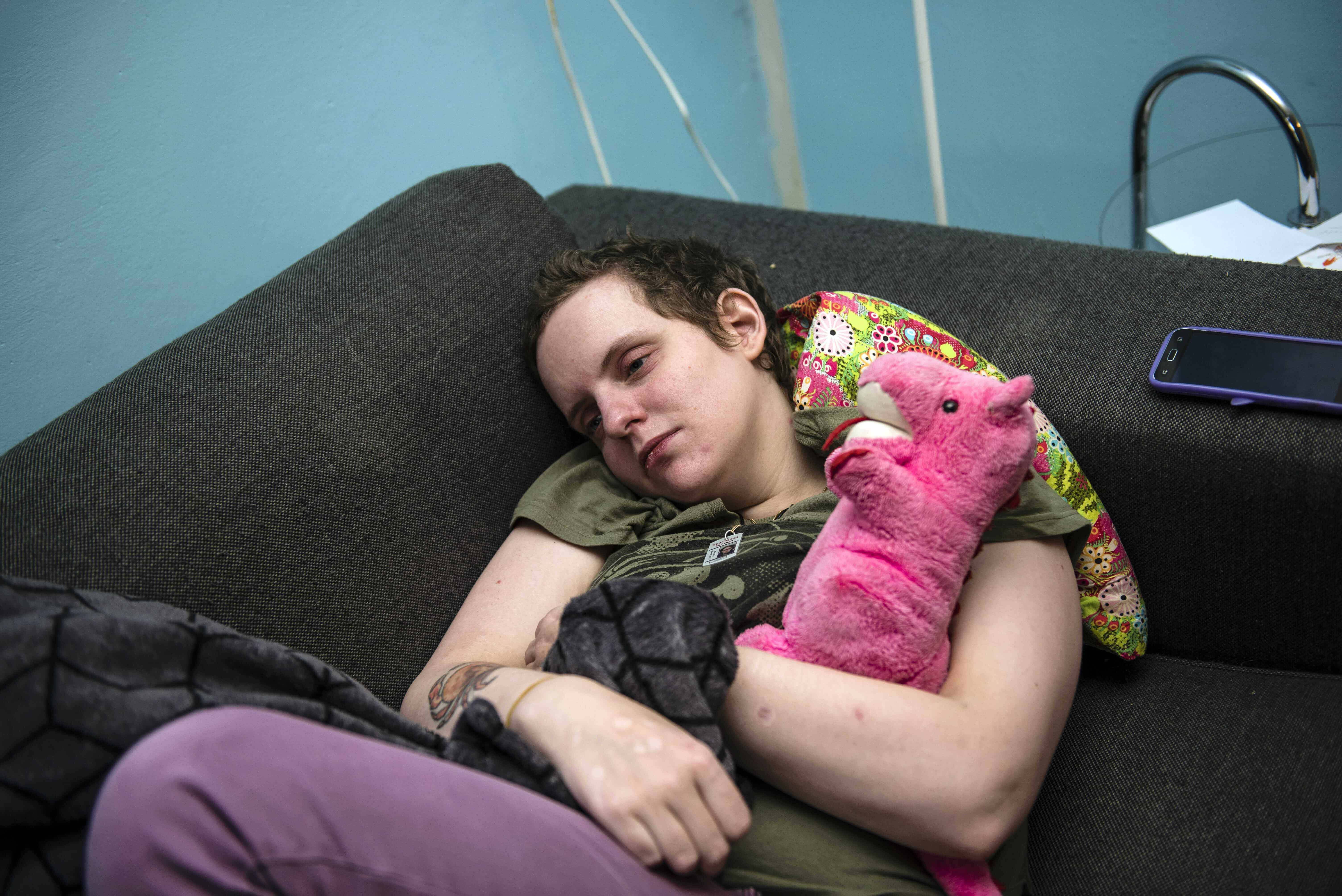
„I will sleep when I am dead!“ Aurelia lies with stuffed animal Dido on the couch. She has sleeping problems. Sometimes she stays awake for more then two days. She gets nightmares when she sleeps. Usually she hurts herself during the night
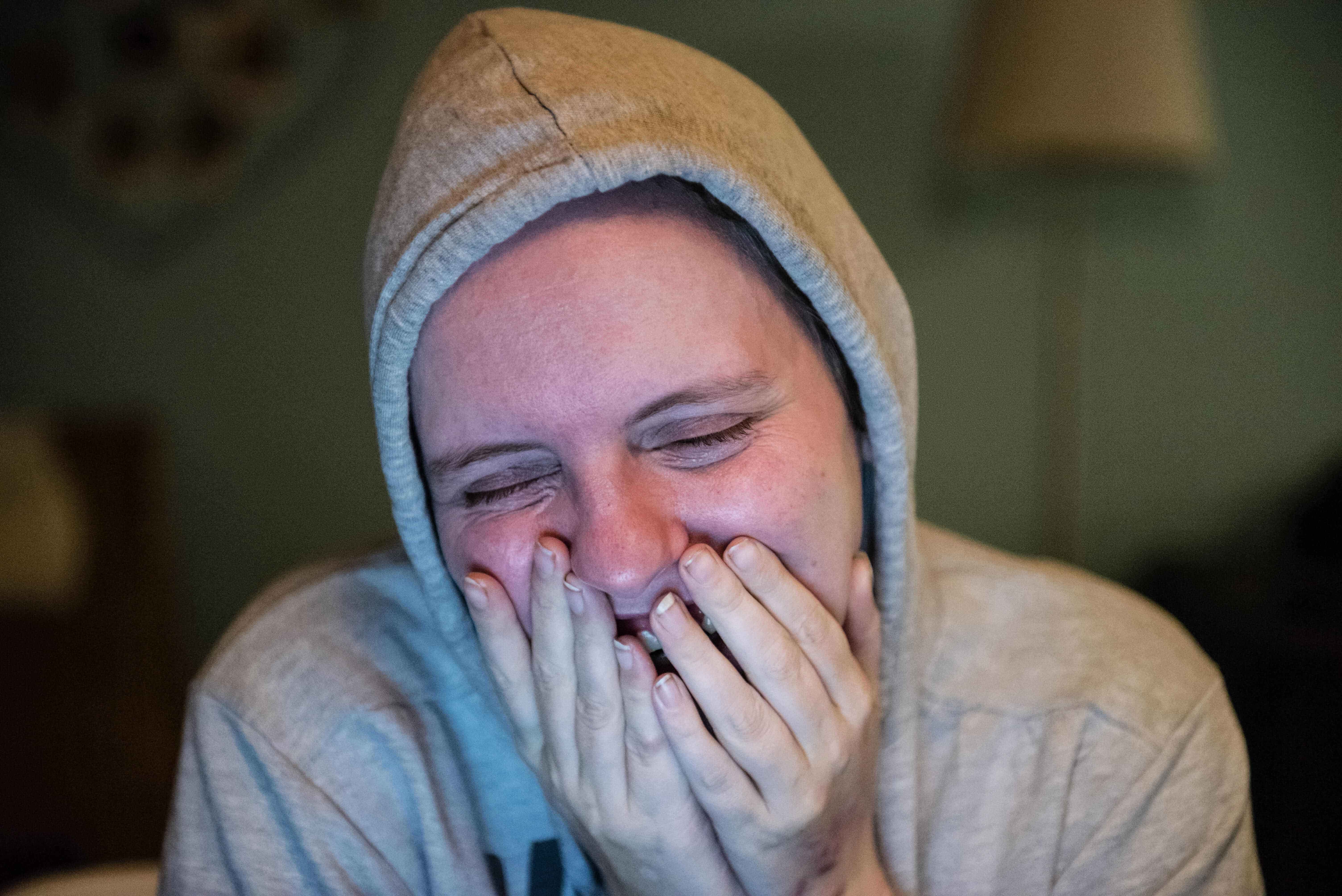
Aurelia reads a message on facebook from someone she doesn’t know. She smiles because he wants to light a candle and change his profile picture on facebook for her on the day she dies
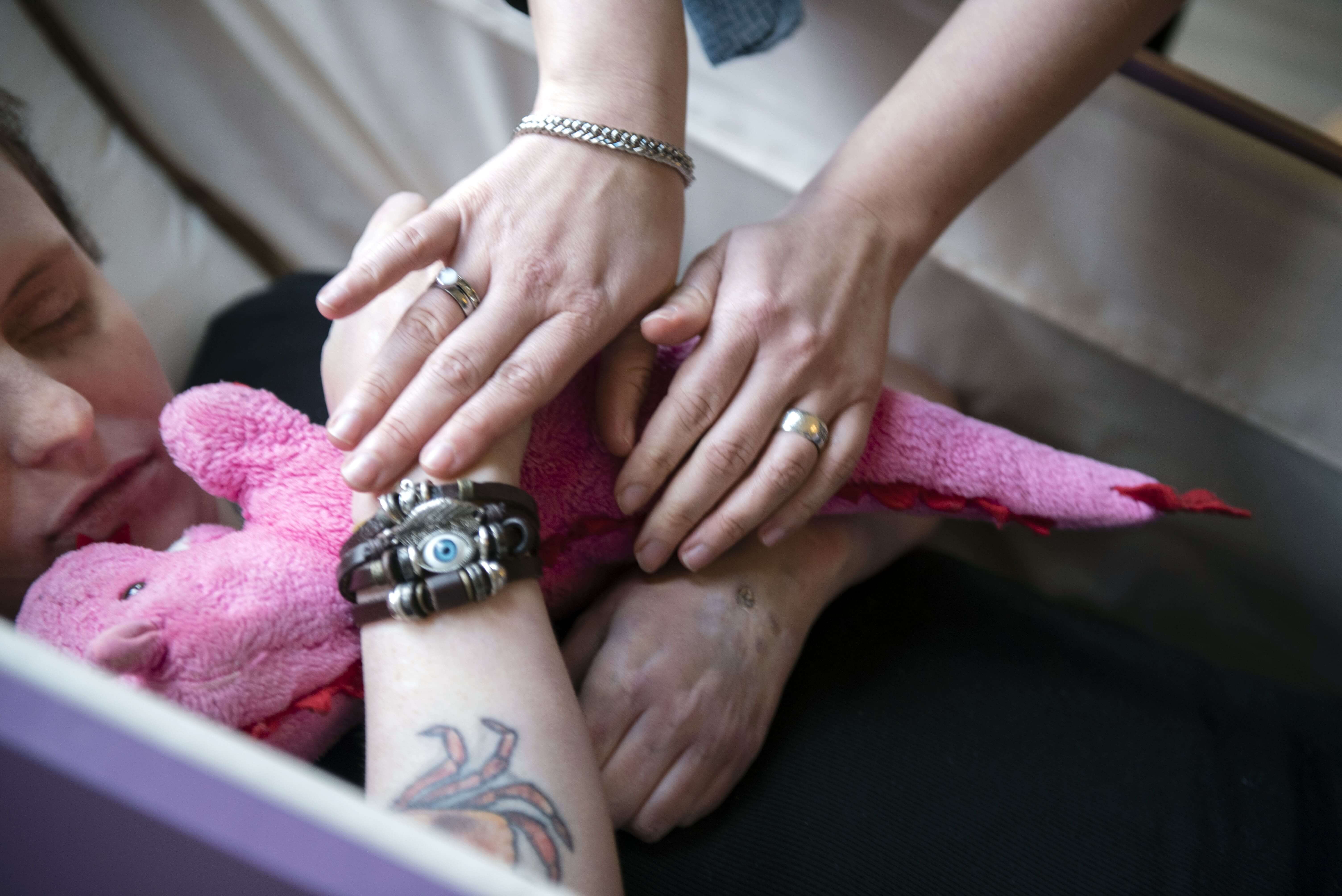
Aurelia lies with her favorite stuffed animal Dido in the coffin. Saying goodbye was the hardest part for her before her death: „You see each other for the last time and what do you have to say? „Bye“? Or black humor: „I come to you as ghost after my death“?“
Translated by Lubov Borshevsky
New and best
